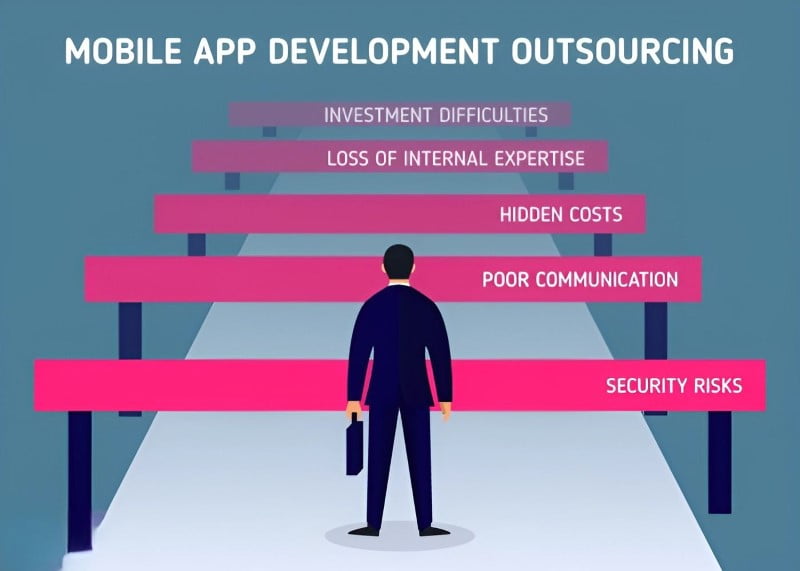Based on Statista’s forecast, the travel app market is booming with projected segment revenue expected to surge by an additional $0.8 billion (a 64% increase) from 2023 to 2027. This presents a golden opportunity for travel businesses to develop applications, enhancing customer experiences and gaining a competitive edge.
Outsourcing software development services for the travel industry can offer numerous benefits for businesses. In this article, we will explore the opportunities and challenges that arise when deciding to use outsourcing services for software development in the travel sector.

The benefits of outsourcing travel app development
Outsourcing travel app development offers a myriad of advantages, contributing to the seamless creation and enhancement of innovative applications.
Cost-Efficiency
One of the primary benefits lies in significant cost reduction compared to in-house development. By outsourcing, the need to hire and train a full-time development team is eliminated, leading to substantial savings on overhead expenses such as salaries, benefits, and equipment.
Access to Global Talent Pool
Outsourcing opens doors to a diverse and skilled pool of professionals globally. This approach enables businesses to select developers with specialized expertise in various technologies relevant to travel app development, ensuring a high level of competence in the project.
Faster Time-to-Market
Outsourcing accelerates the development process, allowing businesses to launch their travel apps sooner. Dedicated development teams work efficiently, providing a competitive edge by reaching the market faster and capitalizing on early opportunities.

Outsourcing travel app development can expedite time-to-market
Focus on Core Competencies
By outsourcing, internal teams are freed up to concentrate on core business activities related to travel and tourism. This enables employees to channel their efforts towards strategic planning, marketing, and customer service—areas where their expertise lies.
Reduced Risk
Outsourcing mitigates potential risks associated with app development by leveraging the expertise of experienced outsourcing partners. Collaborating with a reputable outsourcing company minimizes the chances of costly mistakes that are often encountered during in-house development.
Scalability and Flexibility
Outsourcing provides the ability to easily scale the development team up or down based on project requirements. This ensures businesses have the right resources at their disposal to meet the evolving needs of their travel app development project.
24/7 Development and Support
Outsourcing enables continuous development and support for travel apps, regardless of the geographical location. Teams located in different time zones can work around the clock, ensuring round-the-clock service and enhanced customer satisfaction. This seamless support structure contributes to the overall success and effectiveness of the travel app in the competitive market.
Challenges of Outsourcing Travel App Development
Language and Cultural Barriers
- Communication and misunderstanding: Working with teams in different countries can lead to communication challenges due to language or cultural differences. This can affect service quality and customer satisfaction.
- Mitigation: Choose providers with experience in the travel industry and consider locations with fewer language barriers. Invest in clear communication protocols and encourage cultural sensitivity.
Data Security
- Data breach risk: Sharing sensitive customer data with an external team introduces the potential for data breaches. This can have significant legal and reputational consequences.
- Mitigation: Implement robust security measures like data encryption, access controls, and multi-factor authentication. Conduct regular audits to ensure compliance with data protection regulations like GDPR or CCPA.

Data security is a key concern in outsourcing travel app development
Quality Control
- Loss of control: Outsourcing can lead to a feeling of losing control over service quality, potentially impacting your brand reputation.
- Mitigation: Establish clear service level agreements (SLAs) with your outsourcing partner that define and measure key quality metrics. Regularly evaluate the partner’s performance against these SLAs and address any deviations promptly.
Time Zone Differences
- Scheduling and communication issues: Working with teams in different time zones can lead to challenges in scheduling meetings, coordinating efforts, and ensuring smooth communication.
- Mitigation: Establish regular communication channels (e.g., email, project management tools) and utilize collaborative technology solutions to bridge the gap. Implement clear expectations regarding response times and manage time zone differences effectively to avoid delays and ensure seamless project execution.
How to Find the Best Partner for Your Travel App Development Project
Developing a travel app requires expertise, resources, and a strategic approach. Partnering with the right outsourcing company can significantly enhance your chances of success. Here’s a comprehensive guide to finding the ideal partner for your project:
Research and Shortlist Mobile App Development Companies:
Start by conducting online searches using keywords like “top mobile app development companies” or “best travel app developers.” Platforms like Clutch and Goodfirms can provide comprehensive lists and reviews. Seek industry-specific insights from blogs, publications, and online communities.
Consider Location and Economy:
Evaluate potential outsourcing destinations strategically by considering factors such as the talent pool, cost-effectiveness, and language barriers. Popular destinations like India, Ukraine, Thailand, and Belarus often stand out due to their skilled workforce and competitive rates.
Assess Expertise and Industry Experience:
Prioritize companies with technical skills and specific industry understanding in travel app development. Conduct market research to finalize your technology stack and skill set requirements, aligning them with current trends and features.
Determine Company Size:
Tailor your choice based on project complexity. For mission-critical, highly complex projects, larger companies with established in-house teams might be preferable. Evaluate the company’s team structure to ensure they have the necessary resources for your project.
Review Portfolio:
Scrutinize the company’s portfolio to assess their experience with similar travel app projects, the complexity of projects undertaken, and their ability to deliver user-friendly and crash-free experiences.
Check Company Reputation:
Investigate client experiences through testimonials, project completion rates, and employee retention data. Consider broader factors such as client feedback, number of projects delivered, and overall industry reputation.
Assess Received Proposals:
Evaluate responses comprehensively, comparing capabilities and contacting references provided by shortlisted companies. Critically assess how references align with your project needs.
Write Job Description and Send RFP:
Draft a detailed Request for Proposal (RFP) outlining your project, including project description, desired features, key milestones, timelines, budgeted costs, and regulatory standards. Include necessary agreements such as a service level agreement (SLA) and non-disclosure agreement (NDA).
Conduct Meetings and Negotiate:
Schedule virtual meetings with 3-4 shortlisted companies. Discuss and negotiate critical factors like budget, project timeline, non-disclosure agreements (NDA), intellectual property (IP) transfer, and non-employment agreements (NEA).
Why Vietnam is the best destination for outsourcing travel app
While there are various options for outsourcing travel app development, Vietnam presents a compelling case for businesses seeking a combination of skilled talent, cost-effectiveness, and a thriving tech ecosystem:
Vietnam’s Rise in Software Outsourcing:
Vietnam offers a highly skilled workforce in IT, cost-effective labor, a favorable business environment with government support, a growing tech ecosystem fostering innovation, and global collaboration facilitated by a favorable time zone.
Vietnam boasts a multitude of established and reputable software outsourcing companies. These companies offer a wide range of services, including web development, mobile app development, and software testing, making them one-stop shops for your development needs.
Table Of Content


